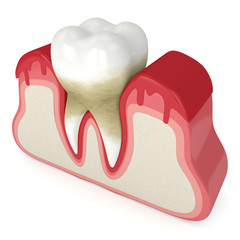
Your Bleeding and Swollen Gums Are a Cry for Help
Bleeding and swollen gums are usually a sign of gum disease which can be caused by plaque and tartar buildup around your teeth. As gum disease progresses, it damages the gums and underlying bone, leading to tooth instability and eventual loss. It may come as a surprise to you. Gum disease, rather than decay, is the predominant reason behind the majority of tooth loss cases. This process often occurs silently. Therefore, bleeding gums is one of few signs to pick up gum disease.
Some common reasons why gums may bleed include:
Gingivitis
Gingivitis is the early stage of gum disease (periodontal disease). It occurs due to the buildup of plaque and tartar along the gumline, leading to inflammation and irritation of the gums. Bleeding gums are a common symptom of gingivitis.
Poor oral hygiene
Inadequate brushing and flossing can lead to the accumulation of plaque and bacteria along the gumline and between the teeth. Over time, this can cause gum inflammation, known as gingivitis, which may result in bleeding gums.
Aggressive brushing or flossing
Brushing or flossing too vigorously or using a toothbrush with hard bristles can irritate the gums and cause them to bleed. It’s essential to use gentle, circular motions when brushing and to use dental floss gently between the teeth.
Medications
Some medications, such as blood thinners or certain antihypertensive drugs, can increase the likelihood of gum bleeding. If you are taking medication and experiencing bleeding gums, consult your healthcare provider.
Hormonal changes
Hormonal fluctuations, such as those that occur during puberty, pregnancy, menstruation, or menopause, can affect gum health and make them more prone to bleeding.
Smoking
Smoking weakens the immune system and reduces blood flow to the gums, making them more susceptible to infection and bleeding. Smoking also hinders the body’s ability to heal gum tissue.
Systemic diseases
Certain systemic conditions, such as diabetes or leukemia, can affect gum health and increase the risk of bleeding gums.
Poor nutrition
A diet lacking in essential nutrients, particularly vitamin C, can weaken the gums and make them more prone to bleeding.
Gum disease, if left untreated, can lead to inflammation and infection not only in the gums but also throughout the body. This chronic inflammation has been linked to an increased risk of various systemic health issues, including:
Cardiovascular Disease: Inflammation from gum disease may contribute to the development of heart disease, including conditions like atherosclerosis (hardening of the arteries) and an increased risk of heart attacks and strokes.
Diabetes: Gum disease can make it harder to control blood sugar levels, worsening diabetes symptoms and increasing the risk of complications for diabetic patients.
Respiratory Infections: Bacteria from the mouth can be aspirated into the lungs, potentially leading to respiratory infections such as pneumonia, especially in individuals with compromised immune systems.
Pregnancy Complications: Pregnant individuals with gum disease may have a higher risk of preterm birth and low birth weight for their babies.
Arthritis: Some research suggests a link between gum disease and rheumatoid arthritis, with inflammation in the gums potentially exacerbating symptoms of joint pain and swelling.
To avoid bleeding and swollen gums, it is important to have regular professional dental cleaning and good home oral hygiene. If you are experience bleeding gums, it’s important to see our Balwyn dentists at Boroondara Dental for a comprehensive evaluation. We can identify the underlying cause of the bleeding and recommend appropriate treatment, which may include improving oral hygiene habits, additional dental cleanings, gum disease treatment, or addressing any systemic conditions contributing to the issue.